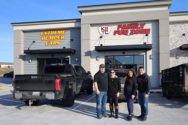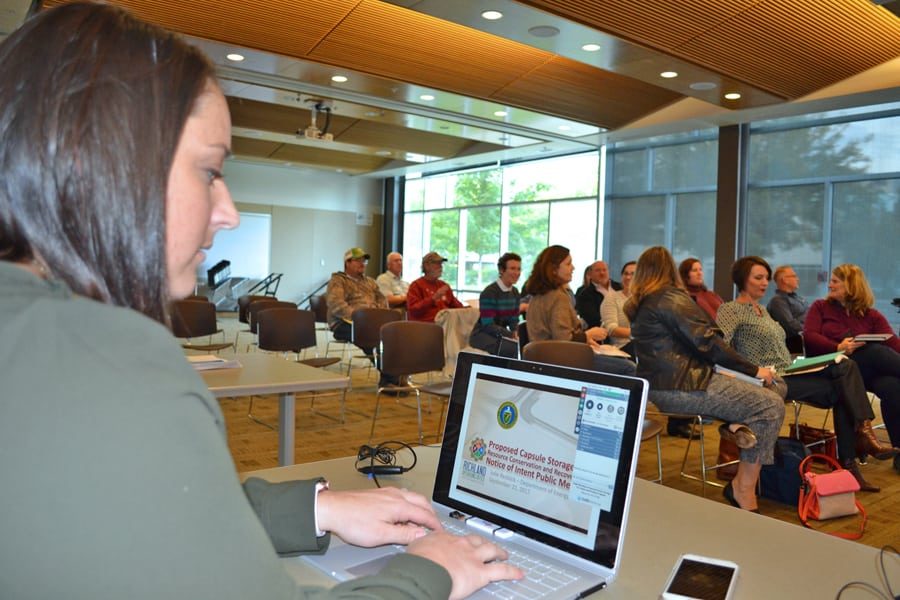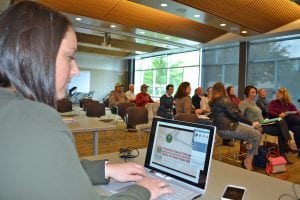
Home » More than 40 people attend Hanford meeting on proposed capsule storage area
More than 40 people attend Hanford meeting on proposed capsule storage area

October 12, 2017
More than 40 people turned out in person or tuned in via webinar on Sept. 21 to learn more about the siting, construction and operation of a proposed capsule storage area at Hanford.
If approved, the facility will be built for dry storage of cesium and strontium capsules—currently in wet storage at the Waste Encapsulation and Storage Facility, or WESF, in the 200 East area of the Hanford site.
DOE Richland Operation’s Physical Scientist Julie Reddick described the building plans, benefits and permitting steps to achieve approval during the public meeting hosted by the U.S. Department of Energy and the state Department of Ecology at the Richland Public Library.
“While the capsules are currently in a safe configuration, WESF is an aging facility,” Reddick said. “Dry storage would significantly reduce the possibility of a release of radioactive material should an unlikely event cause the loss of pool storage water, which may result in the overheating and breach of one or more capsules.”
Ecology’s Mandy Jones explained the state’s role and the process of issuing a dangerous waste permit for the facility. She said Ecology anticipates DOE will submit the permitting application for the proposed capsule storage area facility in October or November.

Attendees learned that back in the 1970s, radioactive isotopes of cesium and strontium were removed from waste and placed in 1,936 stainless steel capsules and stored in concrete pool cells, where they remain today. Workers carefully monitor the capsules in the facility. Water in the pool cells provides radioactive shielding and keeps the capsules cool.
Most of the public’s questions focused on the safe transport of the new casks as future, permanent waste storage options become available.
Susan Leckband, who attended the meeting, said she agreed with the proposed plan and had already cast her vote in favor of this project to be a top priority at a previous meeting about setting Hanford’s budget priorities. “This is a significant accomplishment, a great performance metric and a high value project toward cleanup for a low cost,” Leckband said.
Reddick estimated the project completion cost, including transportation, at $122 million.
Jean Vanni, who attended the meeting, wants the cesium and strontium to be moved off the Hanford site and asked, “Are you designing casks that can be transported?”
Reddick explained that no national nuclear repository had been designated since the elimination of Yucca Mountain in 2010.
“I believe these casks can be modified to meet a specific license once a final repository is made,” she said.
Dirk Dunning asked via the webinar about the safety of Hanford workers during the project. Reddick explained the transfer of capsules has been performed successfully at Hanford before. “We will remove the capsules from the water storage and transfer them into an existing hot cell in WESF, where they will be packaged in new universal capsule sleeves. Once they are ready, the sleeves will be placed in new casks that will be waiting in the WESF truck port. The casks will be driven to the new dry storage pad,” she said.
The meeting ended after about an hour of discussion.
DOE Richland Operations submitted a notice of intent application to Ecology to build the capsule storage area.
The meeting sought to solicit questions and inform the community of the proposed dangerous waste management activities. There was no formal comment period associated with the meeting.
The public will have an opportunity to provide comments during the permit modification process, which will include a formal comment period as well as an additional public meeting. Those dates have not been set yet.
For questions, contact DOE Richland Operations’ Rich Buel at [email protected], or P.O. Box 550, Richland, WA 99352, or at 509-376-3375, and Ecology’s Randy Bradbury at [email protected], or 3100 Port of Benton Blvd., Richland WA 99354, or at 509-372-7954.
To see the DOE-RL meeting presentation, visit http://bit.ly/CapsuleStoragPresentation.
The U.S. Department of Energy Office of River Protection and Washington River Protection Solutions also extended a comment period on a proposed modification to the Hanford facility dangerous waste permit to incorporate the low activity waste pretreatment system, or LAWPS, facility as a new operating unit group. This proposed modification is required to build and operate the LAWPS facility. The 60-day comment period has been extended from July 17 to Oct. 30.
Visit the Hanford events calendar for more information, including details about how to submit comments, at Hanford.gov.
Local News
KEYWORDS october 2017





